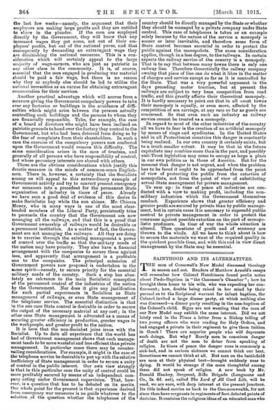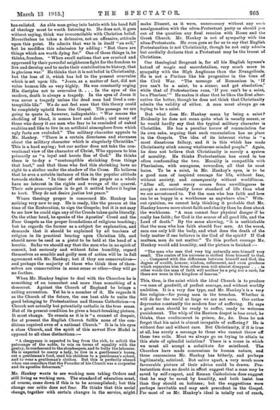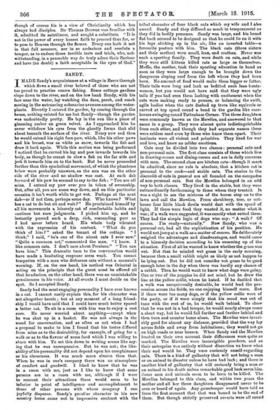SAINTHOOD AND ITS ALTERNATieMS.
rpn-E men of Cromwell's New Model discussed theology
in season and out Readers of Matthew Arnold's essays will remember how Colonel Hutchinson found prolix notes about Psedo-Baptism in "the Canoneees Chamber"; bow he brought them home to his wife, who was expecting her con- finement ; how, doubts being raised in her mind by their pensaal as to the Scriptural warrant for infant baptism, the Colonel invited a large dinner party, at which nothing else was discussed—a dinner party resulting in the non-baptism of the Colonel's child. Signs are not wanting that the men of onr New Model may exhibit the same interest. Did we not lately read in the Times a letter from a Bishop telling of two young officers who were reading for Holy Orders, and had engaged a private in their regiment to give them tuition in Greek I There are superior people who will deprecate such doings. But why P Surely men in conscious danger of death are not the men to debar from speaking of religion. In times of peace the danger zone is commonly a sick-bed, and in serious sickness we cannot think our best. Sometimes we cannot think at all. But men on the battlefield are men at their physical best—brought suddenly near to dying. It would be strange if the more thoughtful among them did not speak of religion. A new book by Mr. Donald Hankey, Sergeant, Rifle Brigade (Longmans and Co., 25. 6d. net), called The Lord of AU Good Life, will be read, we are sure, with deep interest at the present juncture. Its title indeed carries us back to the Commonwealth, for not since then have sergeants in regiments of foot debated points of doctrine. It contains the religious ideas of an educated man who
has enlisted. An able man going into battle with his head full of theology must be worth listening to. He does not, it goes without saying, think war irreconcilable with Christima belief. Nevertheless he takes a defensive, not an offensive, attitude upon this point He admits that war is in itself "an evil," but he modifies this admission by adding : "But there are things which are worth dying for." One of these things is, he thinks, freedom. "When small nations that are crushed and oppressed by their powerful neighbours fight for the freedom to live and develop and to make their contribution to history, that is glorious war." He thinks that it is not belief in Christianity, but the loss of it, which has led to the present overvalue which is set upon life. "Jesus, as a matter of fact, did not value human life so very highly. He was constantly urging His disciples not to overvalue it. . . In the eyes of the modern, death is always a tragedy. In the eyes of Jeans it was never a tragedy unless the dead man had lived a con- temptible life." We do not feel sure that this theory could be completely upheld from the Gospel. The passage we are going to quote is, however, indisputable : "War means the shedding of blood, it means hurt and death ; and many of those who decry it are men who fear to be reminded of naked realities and like to live in an artificial atmosphere from which ugly facts are excluded." The military character appeals to Mr. Hankey. "There is a certain directness and sternness about the military character which is singularly Christlike." This is a hard saying; but our author does not take the con- ventional view of the character of Christ, Who appears to him primarily as "a loyal and heroic Son of God." He thinks there is to-day a "contemptible shrinking from things that hurt," and that those who feel this shrinking have no right to a shelter under the shadow of the Cross. He believes that he sees a notable instance of this in the popular attitude towards strikes. "In time of strikes the people as a whole have no interest in the rights and wrongs of the quarrel. Their sole preoccupation is to get it ;fettled before it begins to hurt. They do not desire justice but peace."
Where theology proper is concerned Mr. Hankey has nothing very new to say. He is ready, like the parson at the time of the Restoration, to sign the Gospels; but it is not easy to see how he could sign any of the Creeds taken quite literally. On the other hand, he speaks of the Apostles' Creed and the Four Gospels as the proper foundations of religious teaching; but he regards the former as a subject for explanation, and demands that it should be explained by all teachers of religion in its practical bearing upon Christian life, and should never be used as a pistol to be held at the head of a heretic. So far we should say that the men who in no spirit of conceit, bat seriously and without false humility, regard themselves as sensible and godly men of action will be in full agreement with Mr. Hankey; but if they are conservatives— and perhaps the majority of those who think thus of them- selves are conservatives in some sense or other—they will go no further.
When Mr. Hankey begins to deal with the Churches he is something of an iconoclast and more than something of a democrat. Against the Church of England be brings a railing accusation. Yet he is a member of it. He regards it as the Church of the future, the one best able to unite the good belonging to Protestantism and Roman Catholicism—a Church not actually but potentially catholic in the true sense. But of its present condition he gives a heart-breaking picture. It must change. To remain as it is is "a counsel of despair, for at present the English Church fulfils none of the con- ditions required even of a national Church." It is in his eyes a clues Church, and the spirit of this newest New Model is opposed to all class distinctions:— " A clergyman is expected to beg from the rich, to solicit the patronage of the noble, to mix on terms of equality with the gentry, to condescend to the shopkeepers, and to bully the labourer. He is expected to marry a lady, to live in a gentleman's house, eat a gentleman's food, send his children to a gentleman's school, and to wear a gentleman's clothes. But this is perfectly absurd when one considers that the Founder of his Church was a carpenter and its apostles fishermen."
Mr. Hankey wants to see working men taking Orders and still living as working men. The standard of education must, of course, come down if this is to be accomplished; but this change our critic does not fear. He thinks that this social change, together with certain changes in the service, might make Dissent, as it were, unnecessary without any such amalgamation with the ultra-Protestant party as should put out of the question any final reunion with Rome and the Greek Church. Mr. Hankey is out of sympathy with the ultra-Protestants. Ho even goes so far as to say that English Protestantism is not Christianity, though he not only admits but cordially declares that a Protestant may be the truest of Christians.
Our theological Sergeant is, for all his English layman's hatred of magic and sacerdotaliam, very much more la sympathy with the High Anglicans than the Evangelicals- He is not a Puritan like his progenitor in the time of the Civil War. "The message of Romanism is, 'I you can't be a saint, be a sinner, and get absolution: while that of Protestantism runs, 'If you can't be a saint, be a Pharisee.'" He makes it clear that he likes the first alter- native the better, though he does not think that Christianity admits the validity of either. A man must always go on trying to be a saint.
But what does Mr. Henke), mean by being a saint ? Evidently he does not mean quite what is usually meant, or he would hardly say that the typical military character is Cbristlike. He has a peculiar horror of renunciation for its own sake, arguing that such renunciation has no place in the Gospels. The idea of its inherent virtue is "a most disastrous fallacy, and it is this which has made Christianity stink among wholesome-minded people." Again, he does not believe that Christianity is merely a system of morality. He thinks Proteatantiam has erred in too often confounding the two. Morality is compatible with Pharisaism, with smugness, cowardice, all that he most hates. To he a saint, in Mr. Hankey's eyes, is to be a good man of inspired courage for life, without fear, without anxiety, and consequently without worldliness. "After all, most worry comes from unwillingness to accept a conventionally lower standard of life than what we are accustomed to. Yet the man who has faith and love can be as happy in a workhouse as anywhere else." With- out cynicism, we cannot help thinking it probable that Mr. Hankey knows more about faith and charity than he does about the workhouse. "I man cannot fear physical danger if he really has faith ; for God is the source of all good life, and the Lord of death." By the same showing, "it is unthinkable that the man who has faith should fear men. At the worst, men can only kill the body, and what does the death of the body matter if one believes in the God of the spirit? If God matters, men do not matter." To this perfect courage Mr. Hankey would add humility, and the picture is finished "The man who sees God very big naturally sees himself very small. The centre of his universe is shifted from himself to God. . . . Compared with the difference between himself and God, the degree of wealth, honour, wisdom, refinement, and oven goodness which separates him from other men will almost disappear . . . ia other words the man of faith will neither be sprig nor a snob, for there are none in the kingdom of heaven," This, then, is the saint which the ideal Church is to produce —a man of goodwill, of perfect courage, and without worldly ambition. Ills a very fine type, and Mr. Hankey's is a very fine religion—for young men in the trenches. Whether it will do for the world at large we are not sere. Our author deprecates constantly the modern fear of suffering. He says a good man should be ready to suffer, ready to welcome punishment. The whip of the Eastern despot is loss cruel, he thinks, than conlinement in prison, dm., dm. Does he not forget that his saint is almost incapable of suffering I' He is without fear and without care. But Christianity, if it is true at all, has surely a message to those who cannot throw off these two evils. Must we always go on trying to attain to this state of splendid isolation? There is a sense in which we must all accept a substitute for sainthood. The Churches have made concessions to human nature, and these concessions Mr. Hankey has bitterly, and perhaps legitimately, satirized. But satire apart, a very much more favourable picture of their advice could ho drawn. Pro- testantism does no doubt in effect suggest that a man may be saved by self.respeot, and Roman Catholicism does suggest that he may be saved by humility, and both insist leas than they should on holiness ; but the suggestions were perhaps inevitable and may seek precedent in the Gospel. For moat of us Mr. Hankey's ideal is totally out of reach,
though of course his is a view of Christianity which has always had disciples. Sir Thomas Browne was familiar with it, admitted its saintliness, and sought a substitute. "It is not in the power of every honest faith to proceed thus far, or to pass to Heaven through the flames. Every one bath it not in that fall measure, nor in so audacious and resolute a temper, as to endure those terrible testa and trials, who, not- withstanding, in a peaceable way do truly adore their Saviour and have (no doubt) a faith acceptable in the eyes of God."




































 Previous page
Previous page